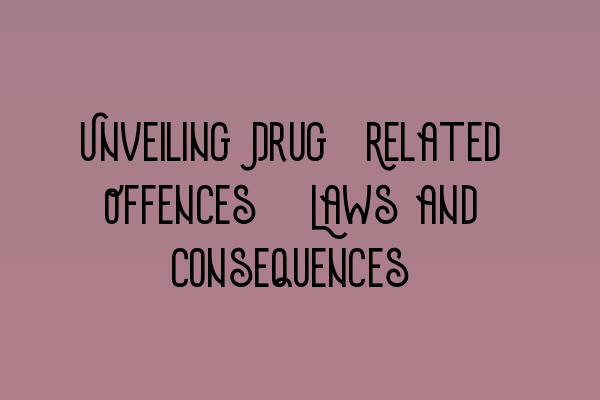Unveiling Drug-Related Offences: Laws and Consequences
Welcome to SQE Criminal Law & Practice Law UK’s blog, where we unravel the complexities of drug-related offences, their laws, and the serious consequences they entail. In this article, we aim to provide you with valuable insights into the legal aspects surrounding drug offenses in the UK.
Understanding Drug Laws in the UK
In the United Kingdom, drug-related offences fall under the Misuse of Drugs Act 1971, which aims to regulate and control the possession, supply, and production of controlled substances. It classifies drugs into different categories, ranging from Class A to Class C, depending on the potential harm they pose. Drugs such as heroin and cocaine are classified as Class A, while substances like anabolic steroids are classified as Class C.
It is crucial to be aware of the drug classifications, as the penalties for drug offenses vary depending on the class of the controlled substance involved. Understanding the specific laws and consequences associated with each drug class is essential to navigate the complexities of drug-related offences.
Consequences of Drug-Related Offences
Engaging in drug-related activities can have significant legal repercussions. The severity of the consequences depends on various factors, including the quantity of drugs involved, the intent behind the activity, and the individual’s previous criminal record.
Drug-related convictions can result in lengthy prison sentences, hefty fines, and even confiscation of assets. Additionally, a criminal record can have long-lasting effects on employment prospects, travel opportunities, and personal reputation. It is essential to seek legal advice promptly if you find yourself facing drug-related charges.
Common Drug-Related Offences
Let’s explore some of the most common drug-related offences in the UK:
- Drug Possession: Possessing a controlled substance, such as cannabis, ecstasy, or cocaine, without a valid prescription or authorization from relevant authorities.
- Drug Supply: The act of selling, providing, or offering to supply controlled substances to others. This offense carries more severe penalties than drug possession.
- Drug Production: Cultivating, manufacturing, or producing controlled substances, such as cannabis plants or illegal laboratories for the production of methamphetamine.
- Drug Trafficking: The transportation, importation, or exportation of controlled substances across borders or within the country.
- Drug Conspiracy: Participating in a plan or agreement to commit drug-related offenses, even if the offense itself is not carried out.
These are just a few examples, and there are various other drug-related offences recognized under UK law.
Legal Representation and Defense Strategies
If you find yourself charged with a drug-related offence, it is crucial to seek professional legal representation. An experienced criminal defense solicitor can assess your case, analyze the evidence, and develop a comprehensive defense strategy tailored to your specific circumstances.
From challenging the legality of search and seizure procedures to questioning the reliability of witness statements, a skilled solicitor will use their expertise to protect your rights and mount a robust defense.
Conclusion
Drug-related offences carry severe penalties and can have a profound impact on various aspects of an individual’s life. It is essential to have a sound understanding of drug laws and seek legal advice promptly if facing charges. At SQE Criminal Law & Practice Law UK, our team of expert solicitors is equipped to handle drug-related cases, providing professional guidance and strong legal representation. Contact us today to discuss your situation and protect your rights.
Related Articles:
- Essentials of Consideration: Understanding the Backbone of Contracts
- Mistake in Contract Law: Unraveling the Impact on Agreement Validity
- Assignment of Contracts: Rights, Obligations, and Legal Considerations
- Counter-offers: The Art of Negotiating in Contract Law
- The Formation of a Contract: Understanding the Building Blocks of Agreement
